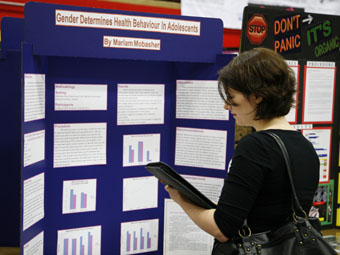Dawn will be visiting her alma mater & speaking on her recent work.

If you missed the talk, check out http://www.fejes.ca/ (link) for a synopsis.


Dawn will be visiting her alma mater & speaking on her recent work.

If you missed the talk, check out http://www.fejes.ca/ (link) for a synopsis.
During the course of Dr. Bowdish’s PhD she discovered that host defence peptides (formerly known as antimicrobial peptides) were not actually bactericidal under physiological conditions. Instead they worked by interacting with the leukocytes as “immunomodulators” altering cytokine responses and chemotaxis and altering the leukocyte’s pro-inflammatory response. This work was the basis of a patent which resulted in the creation of Inimex Pharmaceuticals. Recently Inimex has announced that they have successfully passed Phase I clinical trial for their IDR (Immune Defence Regulator), a new class of anti-infective drugs. Read the press release here.
The Bowdish lab has an ongoing interest in developing novel anti-infective agents.
The Bowdish lab’s first member, Zhongyuan Tu, has won a summer studentship award from the IIDR for his proposal called “How does the macrophage scavenger receptor MARCO signal?”. Zhongyuan will be starting in the lab in May and will continue on as a thesis student. During this time he will study the role of the macrophage scavenger receptor MARCO in adhesion, motility and phagocytosis. Congratulations Zhongyuan!
The IIDR has awarded the Bowdish lab seed money to study the role of macrophages in host response to colonization by Streptococcus pneumoniae. S. pneumoniae infections can range from treatable (respiratory tract infections, otitis) to life-threatening (meningitis, sepsis). The introduction of the pneumococcal conjugate vaccine (PCV) has shifted the epidemiology of S. pneumoniae infections but not eliminated them. In humans, colonization of the upper respiratory tract is the initial step in pathogenesis. This is accompanied by a robust antibody response, which is generally believed to be required for clearance (and thus prevention of infection); however, data for this is not supported by clinical observations in which high levels of antibodies are not associated with clearance or in which immunodeficient patients susceptible to pneumococcal infections can produce robust anti-pneumococcal antibody responses while still being prone to recurrent systemic infections. The aim of this project is to assess the importance of macrophages in the recognition and clearance of S. pneumoniae in the upper respiratory tract. This work will be done in collaboration with Prof. Jeffrey Weiser at the University of Pennsylvania who is a world leader in the field of S. pneumoniae pathogenesis. Dawn will be travelling to his lab in July to learn from his lab members. The Bowdish lab is currently recruiting graduate students and post-docs who are interested in the host response to S. pneumoniae infection and colonization.
 Dawn attended the Bay Area Science and Engineering Fair as a merit judge. She spent a very enjoyable day meeting with grade 7 & 8 students. The projects were superb and the students were extremely enthusiastic and bright. She foresees being involved for years to come.
Dawn attended the Bay Area Science and Engineering Fair as a merit judge. She spent a very enjoyable day meeting with grade 7 & 8 students. The projects were superb and the students were extremely enthusiastic and bright. She foresees being involved for years to come.
The Bowdish lab is looking for highly motivated graduate students who are interested in studying the role of macrophage receptors in infectious disease starting in September 09.
Dawn to attend a CIHR Infection & Immunity New Investigator conference in King City, Ontario, April 17-19. Meet her there.